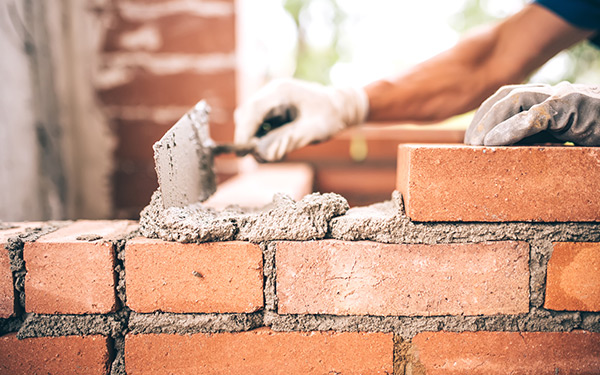Opening the Keys of Lasting Masonry Construction Practices for Eco-Friendly Buildings
Among the myriad techniques to environment-friendly building, sustainable stonework construction stands out as a reliable and resilient technique that holds a wealth of untapped potential. From the selection of materials to cutting-edge construction methods, the keys to achieving sustainability within masonry building are complex and intriguing.
Advantages of Lasting Stonework Building
Accepting sustainable masonry building methods not only decreases environmental influence yet likewise uses long-lasting economic advantages to builders and communities. By making use of products like recycled bricks, blocks, and rocks, building contractors can considerably decrease the carbon impact of their jobs while promoting source efficiency. In addition, lasting stonework building and construction methods, such as proper insulation and thermal mass buildings, can improve energy performance within buildings, bring about minimized operational expenses in time.
In addition, the durability and durability of masonry frameworks add to long-term financial benefits. Structures constructed making use of sustainable stonework practices commonly call for less repair and maintenance, converting to cost savings for builders and home proprietors. The durability of masonry products also makes sure that structures remain secure and safe, reducing the requirement for constant renovations or replacements.
Eco-Friendly Stonework Products
Utilizing green stonework products is a critical action in the direction of improving the sustainability of building methods and decreasing environmental effect while optimizing long-lasting economic benefits. Sustainable stonework products are sourced, generated, and used in a manner that reduces total ecological influence. Materials such as recycled bricks, reclaimed stone, and lasting concrete blocks are ending up being progressively preferred selections for eco-conscious contractors. Recycled bricks, for instance, not just draw away waste from land fills yet additionally call for much less power to create contrasted to brand-new blocks. Redeemed rock uses a special visual allure while lowering the requirement for brand-new quarrying. Lasting concrete blocks incorporate recycled aggregates and may feature enhanced insulation residential properties, adding to energy efficiency in buildings.
In addition, all-natural materials like adobe, rammed earth, and straw bundles supply outstanding thermal mass homes, reducing the need for home heating and cooling power. These materials are usually locally readily available, promoting local economic climates and decreasing transportation-related carbon emissions. By choosing environment-friendly masonry products, construction jobs can considerably lower their ecological footprint and add to the creation of much healthier, more lasting constructed environments.
Energy-Efficient Stonework Techniques
Energy effectiveness plays an important function in improving the sustainability of masonry building methods. One vital energy-efficient stonework strategy is the use of thermal mass, which involves incorporating dense materials like concrete or brick right into the structure's framework to soak up and save heat.

Technologies in Sustainable Stonework
Recent innovations in sustainable stonework practices have actually brought about ingenious techniques that are reshaping the building industry. One such technology is the development of their explanation self-healing concrete, which uses bacteria embedded within the concrete to recover cracks autonomously. This development not only lowers maintenance prices but also improves the sturdiness of stonework structures, adding to their sustainability.
An additional noteworthy advancement is making use of recycled aggregates in masonry construction - masonry contractor. By integrating products such as crushed ceramic waste or recycled glass into concrete blends, home builders can minimize the ecological influence of construction jobs while keeping architectural honesty. This practice not only diverts waste from garbage dumps yet also saves natural resources, making it an essential improvement in sustainable masonry building
Moreover, the assimilation of electronic style devices, such as Structure Details Modeling (BIM), is revolutionizing the way masonry structures are intended and created. BIM enables more precise calculations, decreased material wastage, and improved power performance, inevitably bring about even more lasting structure techniques. These technologies jointly symbolize an appealing future for sustainable masonry construction in the era of environment-friendly structures.
Future Trends in Masonry Sustainability
With the innovative strides made in lasting stonework methods, the future trends in stonework sustainability are positioned to additional transform the building industry. Among the crucial patterns shaping the future of masonry sustainability is the enhanced combination of innovation. Improvements such as Building Details Modeling (BIM) and online reality simulations are being made use of to enhance masonry building and construction procedures, leading to reduced product concrete equipment waste and enhanced power effectiveness in buildings.
In addition, the advancement of unique sustainable products is readied to play a considerable duty in boosting the eco-friendliness of masonry building and construction. masonry contractor. Advancements like self-healing concrete, recycled accumulations, and bio-based binders are getting grip for their ability to decrease environmental impact while maintaining architectural integrity

Verdict
To conclude, sustainable masonry construction methods use many advantages for green structures. By utilizing environmentally friendly materials and energy-efficient methods, masonry can add to a more sustainable built environment. Innovations in sustainable masonry are constantly being created to additionally improve the ecological efficiency of buildings. Looking towards the future, the trend of stonework sustainability is anticipated to expand, leading to more environmentally pleasant and energy-efficient construction practices in the years to come.